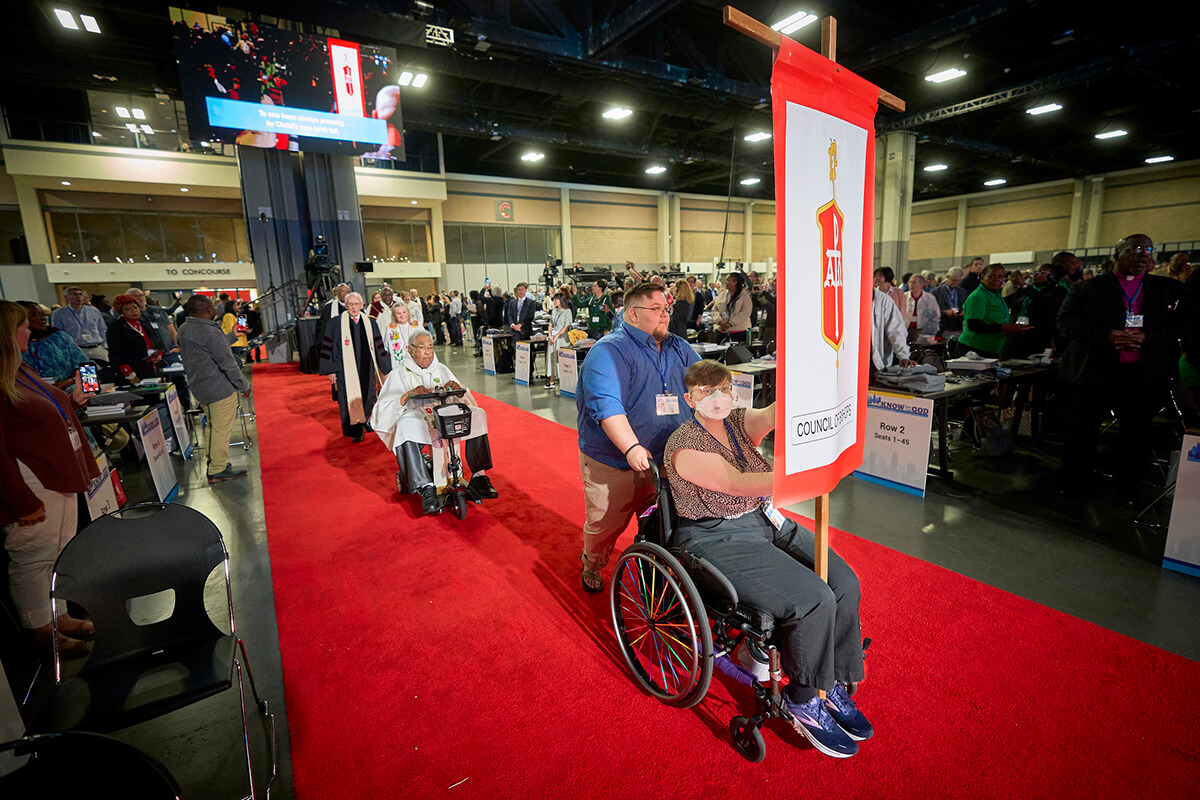Key points:
- Motorized scooters overpower mobility challenges as attendees dash around General Conference.
- The use of various devices ensures delegates participate comfortably in events at the 10-day assembly.
- The toughest lesson for scooter users is learning to control the high speed at their disposal to ensure the safety of those walking around them.
Wheeled into the auditorium for the General Conference opening worship service, Sara Martin carried the Council of Bishops banner. The message was clear: The United Methodist Church’s global gathering is open and accessible to all.
In previous years, people with mobility issues often were restricted by the massive size of convention centers and the long walks from one area to another. This year, assisted by crutches, wheelchairs, walkers, rollators and motorized scooters, dozens of attendees traversed the Charlotte Convention Center.
Older adults and individuals experiencing back or knee problems found it convenient and comfortable to use mobility aides so they could participate actively and help determine the future of the church.
“I couldn’t have been mobile without the scooter,” said Gloria Marple, 71, a deaconess from Idaho. “I need both knees to be surgically replaced as I have no cartilage in them.”
Asked how it felt to maneuver between the plenary, dining and exhibition areas, she responded, “It’s crowded, but everybody is aware of our presence. My sister deaconess is on a cart, too, so we have fun. People tease us, asking if we are going to race. They have been kind about moving out of the way, so we have been fine.
“The scooter is easy to learn to operate,” Marple added. “You just must be mindful of the speed and the fact that there are a lot of people around. I ride scooters in the grocery store and have attended other events where I use a scooter.”

General Conference photos
On an ordinary day, when she is at home, she said, “I walk slow, very slow.”
During the conference, Marple worshipped at a local church not designed for scooter use. “I was in a lot of pain at the end of the day,” she said. “But all areas of the General Conference venue have been easily accessible.”
Cynthia Astle, editor of United Methodist Insight, said the center had good accessibility and she had a comfortable spot in the newsroom with about 80 colleagues.
The distances between meeting areas were too long for Astle to walk, so she brought her rollator walker “Pinkie” to aid mobility.
“There were some places that were tight to walk through with Pinkie,” she said. “People need to understand that everybody is going to be disabled someday. We need a better understanding of the human need and make all areas accessible to everyone.”
Astle has scoliosis. Her curved spine makes walking difficult. One of her legs is shorter than the other, so Pinkie helps her to walk and aids Astle’s stability as she is prone to falling.
She pointed out that the few accessible women’s restrooms in the convention center were also designated as baby-changing stations.
Subscribe to our
e-newsletter
Erie Stuckett of Mississippi rented a motorized scooter for about $300 to enable her to move around the conference venue and to her hotel, located about five blocks away. The General Conference provided motorized scooters for international delegates who needed mobility support.
“It’s easy for me to drive (the scooter),” Stuckett said. “It doesn’t take long to learn how to use it. You can only go forward and back, and it makes a sharp turn so you can navigate around sharp corners.
“I only shop at stores that have scooters nowadays because my back is bad, and I can’t stand for a long time,” she said.
Linda Tate, manager of the Council of Bishops office, said it was a priority to make sure every bishop was cared for throughout their visit to Charlotte.
The Rev. Charlie Rivens, Western North Carolina Conference, was tasked with ensuring retired bishops Arthur Kulah, John Innis and Ntambo Nkulu Ntanda could move to areas of the conference which they desired.
“It has been amazing to understand and see the cultural differences,” Rivens said, “but then have the opportunity to care for, support and serve people with that type of authority and see the humility and kindness that those three have shown.”
When bishops arrived at the convention center, Rivens made sure that the scooters were waiting for them, and he assisted them to go to different areas during the day.
Asked if it was easy to teach someone to use a motorized scooter, he answered, “Anyone can jump on it and go, but there’s no telling where they will end up!”
“For the bishops, I cheated,” Rivens quipped. “I turned the speed down so, at first, I had them moving totally slow. When they were more familiar after a few days, I gave them more speed. Today I gave them about three-quarters of the scooter’s speed.
“I taught them how to move forward and back and how to swerve in tight places, to be mindful not to get too close to people because they were new to this gadget. They were great students.”
Asked how he felt about being “agile” with the aid of a scooter, Kulah, 90, laughed and said, “It makes being here very nice and very sociable. Thank you, General Conference, for being very kind and caring and making us to be part of the gathering. We were able to participate fully.”
Chikwanah is a correspondent for UM News based in Harare, Zimbabwe.
News media contact: Julie Dwyer at (615) 742-5470 or [email protected]. To read more United Methodist news, subscribe to the free daily or weekly Digests.




